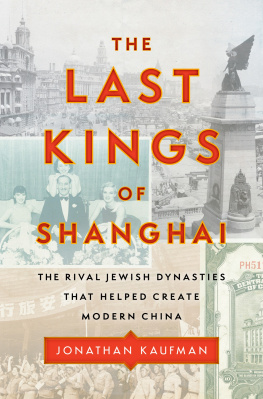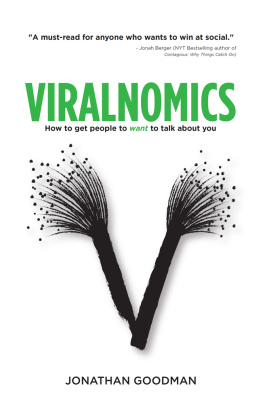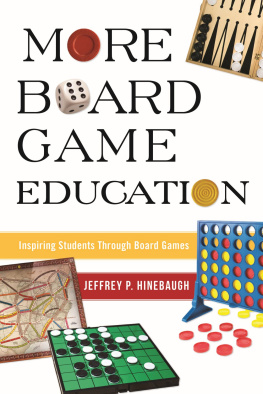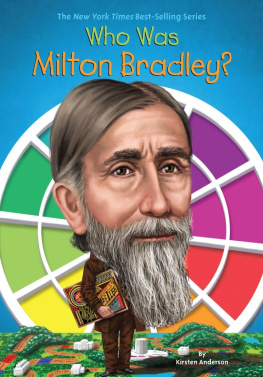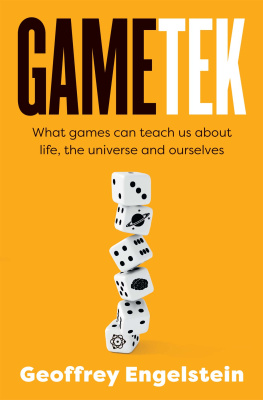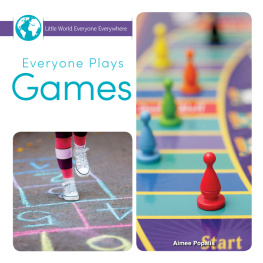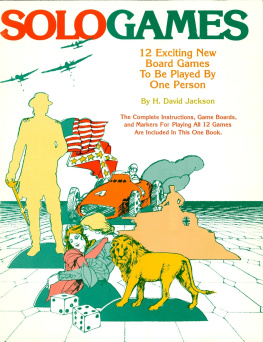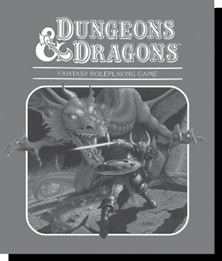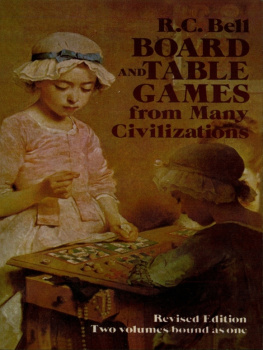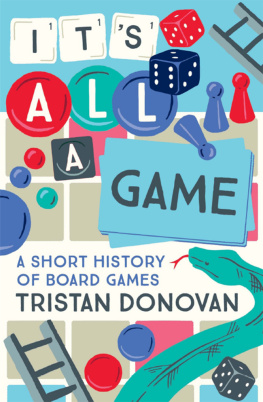Sutherland House
416 Moore Ave., Suite 205
Toronto, ON M4G 1C9
Copyright 2019 by Joan Moriarity and Jonathan Kay
All rights reserved, including the right to reproduce this book or
portions thereof in any form whatsoever. For information on rights and
permissions or to request a special discount for bulk purchases, please
contact Sutherland House at
Sutherland House and logo are registered
trademarks of The Sutherland House Inc.
First edition, September 2019
If you are interested in inviting one of our authors to a live event or
media appearance, please contact
and visit our website at sutherlandhousebooks.com for more
information about our authors and their schedules.
Manufactured in Canada
Cover designed by Greg Tabor
Book composed by Karl Hunt
Game photos by Sean Jacquemain, Photographer and
Managing Editor of dailyworkerplacement.com
Endpaper photos from The Checkered Game of Life (front)
and the modern edition of The Game of Life (back).
Library and Archives Canada Cataloguing in Publication
Title: Your move : what board games teach us about life/
Joan Moriarity, Jonathan Kay.
Names: Moriarity, Joan, author. | Kay, Jonathan, 1968- author.
Description: Includes index.
Identifiers: Canadiana 20190106018 | ISBN 9781999439545 (softcover)
Subjects: LCSH: Board games. | LCSH: Board gamesSocial aspects.
Classification: LCC GV1312 .M67 2019 | DDC 794dc23
ISBN 978-1-9994395-4-5
Welcome to the
Magic Circle
(Joan Moriarity: Lessons from Telestrations)
I WORK AT Snakes & Lattes Board Game Caf in Toronto. My official job title is Game Guru. Guests sometimes tell me that I must have the best job in the world and usually I find it hard to disagree. It is certainly the most rewarding work I have been paid to do and my experiences have led me to co-write this book.
Board games have undergone a tremendous resurgence in the past twenty years but even today I occasionally meet people who are surprised to hear that anyone still plays games on a tabletop instead of some kind of electronic device. (In this book, well use the terms board game and tabletop game interchangeably, even when the games in question do not involve an actual board). In hindsight, perhaps it was inevitable that people would welcome the chance to turn away from their screens, seeking the warmth and connection you get from playing games together with live human family and friends.
Despite its popularity, this hobby can be tricky for newcomers. If you heard somewhere that tabletop games are back and you want to see what all the excitement is about, you come up against two big problems right away: you need to decide which game to play, and you need to learn the rules. My work has taught me that either of those problems can end a beginners journey before it starts. Most of the new people who walk into Snakes & Lattes end up defaulting to the old chestnuts of their youthGuess Who?, Snakes and Ladders, Connect Fourinstead of striking out into this bright new world of games to try something they have never seen before. That is unless they have someone to guide them. That is where I come in.
Every day at work, I help people to find games that will suit their tastes and I help them learn to play so that they do not need to struggle through a rule book. I began doing this shortly after Snakes & Lattes opened in 2010 as North Americas first board game caf. Dozens of similar places have since opened in other cities and what began as a board game renaissance has matured into a new golden age.
There has never been a better time to play games with your friends around a table because there has never been such an extraordinary variety of great games to play. You could stick to the games of past centuries, if you like. You could also stick with the music or movies or literature of previous centuries but that would mean missing out on a lot of amazing things. And if you do so while I am on the jobif you insist on limiting yourself to games from fifty years ago, even if it is for a good reasonI cannot help feeling that I have failed you as a game guru.
My co-author, Jonathan Kay, is a prime example of someone who has jumped in with both feet and embraced everything this reinvigorated artistic medium has to offer. He and I come at the project from different directions: while I am a lifelong game junkie who has become a writer in recent years, he is a lifelong writer who has become an avid game player over the last decade. While I love to introduce games to others and enjoy the hobbys deep and nuanced social dimensions, Jonathan tends to be more focused on games historical and cultural overtones. While Jonathan tends to focus more on lessons about society at large, I tend to examine how playing games can teach us about an individual human soul.
The difference is probably easiest to spot when it comes to the one title that takes center stage in not one but two chapters of this book: Monopoly. My own chapter on Monopoly examines the reasons why so many people today still enjoy a game from 1935 even though, to the eyes of modern game players, it has aged poorly. Jonathan, on the other hand, focuses on the manner in which Monopolys internal structure models the functioning of our economy, our climate, and our history of warfare. That said, both of us came to this project with one thing in common: we see the playing of games not only as a fun way to spend time but as a window into the human condition.
This is not a book of strategy tips or game reviews. It is about the things games can teach us about ourselves. Each chapter focuses on one or two game titles (though references to other games will be scattered about), and draws out a revealed lesson in history, psychology, philosophy, society or culture. Each chapter is designed to stand as an individual essay, so you do not have to read the whole thing in order from start to finish.
* * *
I have already mentioned two big gateway issues that new players face: deciding what to play, and coming to grips with rules. But there is a third problem, one that is, perhaps, more serious than the others: fear of failure. Not a simple issue, as any therapist can attest, but it is something that games have a lot to teach us about if we allow them to. I will approach it here by doing what I do best: I am going to teach you how to play a game.
The best game I can think of to teach you, and illustrate this third problem, is Telestrations (2009). It is a cross between Pictionary and the broken telephone game. You can play with as few as four players, but it is better with more. Each player gets a little spiral-bound booklet full of blank plastic pages, a dry-erase marker, and a secret word or phrase. To begin, you open your booklet to page one and draw a picture of your secret word. Youll need to work fast because you only have about one minute to get it done. And if you think that doesnt sound like enough time to do a good job of it, you are absolutely correct.
When time is up, you pass your booklet clockwise to the player sitting on your left, while the player to your right passes you their booklet. Now you look at the (probably terrible) picture on page one of the booklet you have just received and try (and probably fail) to figure out what it is supposed to be. Then you flip to page two and write down your guess, and pass clockwise to your left again. The player on your right passes you a booklet open to page two with a guess of some kind written there, and now you have one minute to draw a picture of



